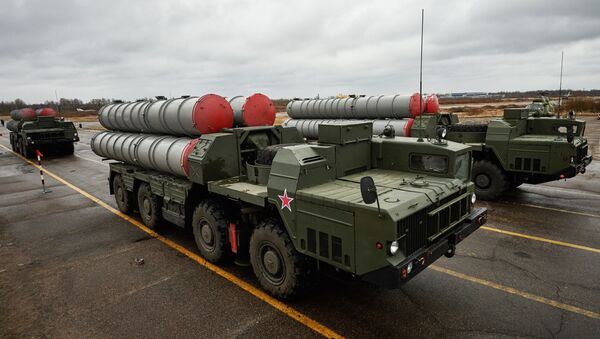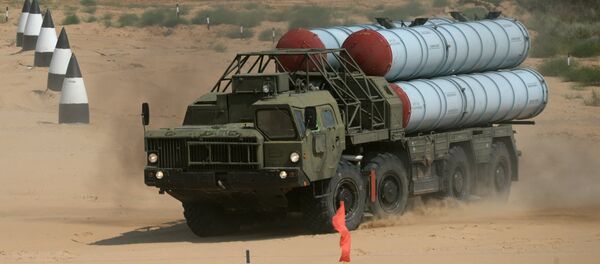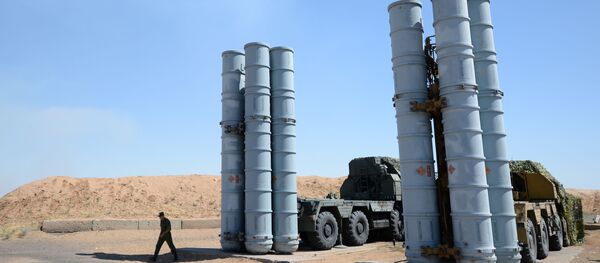Speaking to Sputnik Turkey about the imminent arrival of the Russian air defense systems, which will be complemented by advanced control, centralized management and friend/foe identification systems, Turkish political analyst Dr. Volkan Ozdemir suggested that the deployment is an indication of the effective end of the Russian policy of non-interference in the Israeli-Iranian conflict over Syria.
"From a geopolitical perspective, Russia's strategy toward the Syrian question has been built from the beginning on providing support for Damascus while performing a balancing act between Israel and Iran, two important players in the region," Ozdemir said.
"Russia, for a long time, sat on the sidelines of clashes between these two powers on Syrian territory, without interfering in the actions of the Israeli Air Force, which regularly struck Iranian-backed groups. However, as has been made clear by Russian Defense Minister Sergei Shoigu, the incident with the Il-20 radically changed the alignment of forces," he added.
In effect, the Il-20 incident has opened a new chapter in the Syrian crisis, Ozdemir argued. "The course of the Syrian conflict can be divided into several stages, each of them impacted, to varying degrees, by the changing balance of power on the international arena. One of these stages began on September 30, 2015, when the Russian Aerospace Forces began their anti-terrorist operation in Syria. At that time, this decision greatly influenced the alignment of forces in Syrian territory," the observer recalled.
Ultimately, Ozdemir suggested that the Russian decision to deploy S-300s to Syria "similarly points to the start of a new stage – one where Israel can no longer attack targets in Syria so easily and without consequences, as was the case previously. And if it does decide to do so, it will face a decisive response not only from Iran and Syria, but from Russia as well," Ozdemir concluded.
'S-300 Deliveries Put Israel in a Difficult Position'
Dr. Hasan Unal, a political scientist from Maltepe University in Istanbul, echoed Dr. Ozdemir's sentiment. In Unal's view, the S-300 deployment serves as a "milestone from a military point of view."
"Even the Soviet-made air defenses sent to Syria earlier have repeatedly demonstrated their high efficiency and ability to counter attacks by the Israeli Air Force. Russia's decision to supply its modified, modernized S-300 systems to Syria will put Israel in a very difficult position, providing Damascus with much more serious protection against enemy strikes," he said.
What's more, he said, the air defense system will help "destroy the myth created by Israel about the superiority and invulnerability of its air force…Generally speaking, this situation will undoubtedly severely restrict Israel's room for maneuver," the professor noted.
Ultimately, Dr. Unal believes that the current strength of the Russian hand in Middle Eastern geopolitics means that it may not limit itself to the S-300 deliveries, but take additional measures, including active monitoring of Israeli activity along the Syria-Lebanon border, informing of Syrian forces about the situation in the region, and helping to maintain Syria's defenses directly.
Il-20 Tragedy
On the night of September 17, a Russian Il-20 reconnaissance aircraft with 15 airmen on board was mistakenly shot down by a Syrian anti-aircraft missile off the Syrian coast while returning to Hmeymim airbase. The Syrian missile launch was a response to Israeli airstrikes across multiple Syrian provinces just minutes earlier. The Russian Defense Ministry accused Israel of providing insufficient warning to allow the Russian plane to get out of harm's way, and accused the Israeli Air Force of using the aircraft as a shield against the Syrian air defenses. Tel Aviv has denied the charges, and continues to maintain that Moscow was warned about the airstrikes in a timely manner. The loss of the aircraft prompted Russia to take a series of measures to boost the security of Russian servicemen in Syria, and to provide Damascus with additional military assistance, including the S-300 air defense system. The Russian military has also said that it will carry out the radio-electronic suppression of satellite navigation, airborne radars and combat communications systems of any aircraft attacking Syrian targets, and provide the country with its friend/foe identification system, previously available only to the Russian military.



